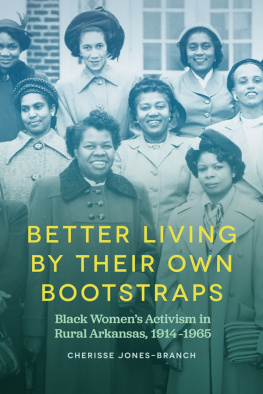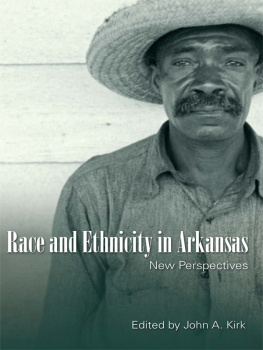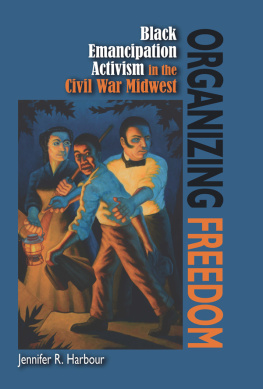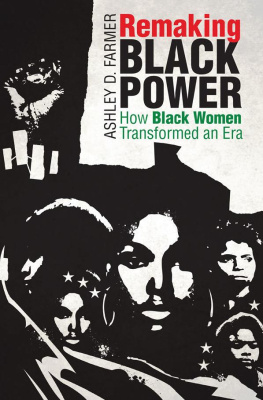Arkansas Histor y
JEANNIE WHAYNE, GENERAL EDITOR
Copyright 2021 by The University of Arkansas Press. All rights reserved. No part of this book should be used or reproduced in any manner without prior permission in writing from the University of Arkansas Press or as expressly permitted by law.
978-1-68226-166-8 (cloth)
978-1-68226-167-5 (paperback)
978-1-61075-744-7 (ebook)
Manufactured in the United States of America
25 24 23 22 21 5 4 3 2 1
Designed by Liz Lester
 The paper used in this publication meets the minimum requirements of the American National Standard for Permanence of Paper for Printed Library Materials Z39.48-1984.
The paper used in this publication meets the minimum requirements of the American National Standard for Permanence of Paper for Printed Library Materials Z39.48-1984.
Library of Congress Cataloging-in-Publication Data
Names: Jones-Branch, Cherisse, author.
Title: Better living by their own bootstraps: Black womens activism in rural Arkansas, 19141965 / Cherisse Jones-Branch.
Other titles: Arkansas history (Fayetteville, Ark.)
Description: Fayetteville: University of Arkansas Press, 2021. | Series: Arkansas history | Includes bibliographical references and index. | Summary: Better Living by Their Own Bootstraps is the first major study to consider Black womens activism in rural Arkansas. The text explores Arkansass rural history to foreground Black womens navigation of racial and gender politics as a means to uplift African Americans, develop opportunities for social mobility, and subvert the formidable structures of white supremacy during the Jim Crow yearsProvided by publisher.
Identifiers: LCCN 2020042353 (print) | LCCN 2020042354 (ebook) | ISBN 9781682261668 (cloth) | ISBN 9781682261675 (paperback) | ISBN 9781610757447 (ebook)
Subjects: LCSH: African American women political activistsArkansasHistory20th century. | Rural African AmericansArkansasHistory20th century. | Rural womenArkansasHistory20th century. | ArkansasRural conditions. | ArkansasRace relations.
Classification: LCC E185.93.A8 J655 2021 (print) | LCC E185.93.A8 (ebook) | DDC 305.896/07301734dc23
LC record available at https://lccn.loc.gov/2020042353
LC ebook record available at https://lccn.loc.gov/2020042354
ACKNOWLEDGMENTS
I would never have been able to write this book without the help and advice of friends, colleagues, and family. Elizabeth Griffin Hills scholarship was among the first I read about Arkansas home extension clubs that piqued my interest in rural Black women members. She very generously shared her digitized research from the Department of Agriculture Extension Service records housed at the National Archives in Fort Worth, Texas. John Kirk at the University of Arkansas at Little Rock unknowingly provided me with the first forum to talk about African American home demonstration agents employed by the Arkansas Agricultural Cooperative Extension Service. Further, I am extremely grateful that I was able to find my tribe when giving my first and subsequent papers at the Agricultural History Society and Rural Womens Studies Association meetings.
Soon after those early meetings, I realized that my research was going to become a book. I so appreciate the staff at Special Collections of the University of Arkansas Libraries (Fayetteville), the Butler Center for Arkansas Studies in Little Rock, University of Central Arkansas Archives, Conway, and the Arts and Sciences Center for Southeast Arkansas, Pine Bluff, for helping me locate little-known information about Black womens activism in rural Arkansas. The help I received from the Arkansas State Archives and the Archives Research Center, Atlanta University Center Robert W. Woodruff Library in Atlanta, Georgia, proved critical to helping me flesh out my analysis of Jeanes Supervising Industrial Teachers, as did scholarship by Valinda Littlefield.
Melissa Walker read an early draft of the manuscript and provided substantial feedback. Her scholarship, along with that of Lu Ann Jones, Linda Ambrose, Joan Jensen, Carmen Harris, Debra Reid, and others, profoundly influenced my understanding of the rich layers and textures embedded in rural womens history. Thank you, Michael Pierce, for the information on Ethel B. Dawson. Because of the very large zip file of information you sent me, I was able to present her life as an agrarian activist at the 2019 European Rural History Organisation meeting in Paris, France. I send a special shout-out to the Delta women writers who read my essay on Dawson. Your sharp eyes and brains helped me think deeply about the many ways to frame herlife and convinced me that I am establishing a new way of exploring Black womens experiences in the rural Jim Crow South.
I certainly could not have finished this book without the staff at Arkansas State Universitys Archives and Special Collections and the Dean B. Ellis Library. They have been wonderfully patient with my many interlibrary loan requests, as well as the large volume of books I have checked out over the years. I promise to return everything as soon as this book is published!
My thanks to the readers, who labored over a very rough draft of my manuscript. I appreciate you tolerating my many mistakes and oversights. Your substantial feedback makes this a much better book.
David Scott Cunningham, I so appreciate your support of this project from the very beginning and your urging me to get it done so it could be published in 2021. I have done that. I thank you and the University of Arkansas Press for providing me with the opportunity to write about this overlooked aspect of Arkansas history.
Dr. Anes Wiley Abraham, thank you for sharing your home archives with me. Your generosity and that of my sisters in the Blytheville Social Arts Club have enriched my knowledge of Black womens activism in Mississippi County and Arkansas. To my Sorors in Sigma Gamma Rho Sorority Incorporated, thank you for welcoming me back into the fold after such a long absence. You truly represent Greater Service, Greater Progress. My family and friends, of course, are more important to me than anything else in the world. Thank you for your love and support throughout this process. You inspire me more than you will ever know, and I always strive to represent you well. I hope I have made you proud.
Finally, I dedicate this book to Annie Zachary Pike, who welcomed me into her home in Marvell and into her heart. Thank you for sharing your story with me. You are a phenomenal woman, and the world should know that.
Introduction
THE IDEA FOR this book came to me as I was finishing my first monograph on womens interracial activism in South Carolina. Sara Z. Daniel, one of the women I chronicled, was a home demonstration agent whose civil rights activism as president of the Manning NAACP in Clarendon County resulted in her losing her job with the South Carolina Agricultural Extension Service. I must admit that it never occurred to me to ask what a home demonstration agent was until I had completed my book. Furthermore, I had no previous training as a rural womens historian, and up until that point I did not know that such a field even existed. But after reading the very fine work of such US scholars as Joan Jensen, Melissa Walker, Katherine Jellison, Grey Osterud, Nancy Berlage, Debra Reid, Carmen Harris, Valerie Grims, Rebecca Sharpless, Jenny Barker Devine, and Canadian historians Linda Ambrose and Margaret Kechnie, I discovered a rich and flourishing field that intentionally centered rural womens experiences.
My interest in rural Black womens activism was subsequently piqued when I read Valerie Grims stellar article From the Yazoo Mississippi Delta to the Urban Communities of the Midwest: Conversations with Rural African American Women, and Carmen Harriss poignant Well, I Just Generally Bes the President of Everything: Rural Black Womens Empowerment through South Carolina Home Demonstration Activities. Using this analytical framework, I questioned how rural Black women accomplished the same while facing the additional challenge of combating southern white racism.









 The paper used in this publication meets the minimum requirements of the American National Standard for Permanence of Paper for Printed Library Materials Z39.48-1984.
The paper used in this publication meets the minimum requirements of the American National Standard for Permanence of Paper for Printed Library Materials Z39.48-1984.